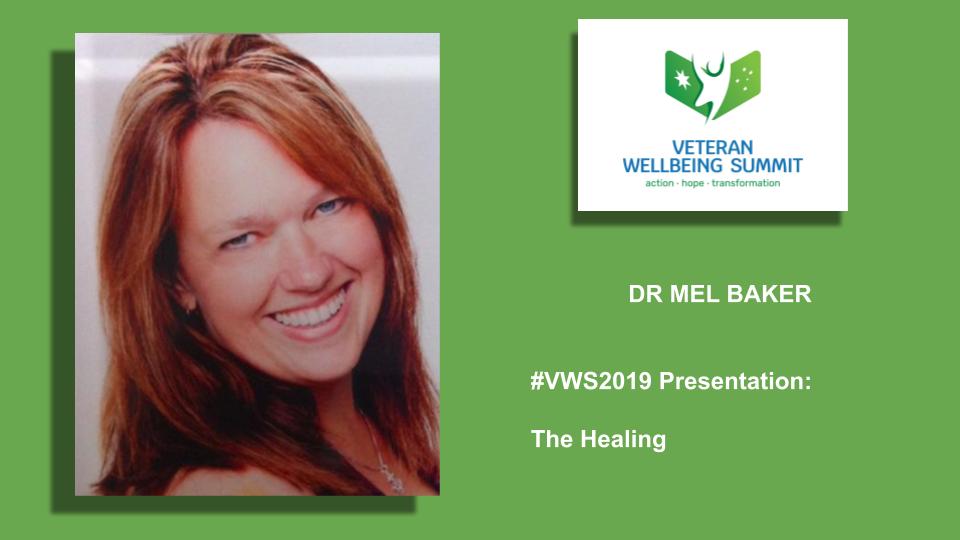The Healing
We thought our lives were held together. We had a good job, good income, good future and great friends, who were like family. Whether it be Navy, Army or Air Force, they discharged us and we left disempowered and broken. We loved our roles, but when trauma hit after a series of events, life started spiralling out of control and we were left wondering what happened. Each of us lost our home, had no income, some lost their family; we all lost our sense of selves. We all suffered from Post Traumatic Stress Disorder (PTSD), depression and anxiety, and some of us had addiction problems and were suicidal. After discharge our roads led to being homeless for a while – one on the riverbank of Brisbane, two in their car in Sydney, another three couch-surfing. Weeks and months went by and some of us even contemplated gaol time over sleeping on the streets. We felt defeated until the day Homes for Heroes stepped in and gave us a roof over our heads in a RSL retirement village.
There is an increasing number of Australian military succumbing to PTSD, depression and suicide. The Australian Federal Government reported in 2018 that 46% of veterans who left the Australian Defence Force (ADF) experienced a mental health disorder. In 2016, double the number of military personnel and veterans committed suicide than were killed in the entire 16 years of the war in Afghanistan. Over 3,000 former Service personnel are homeless each year, wondering through our society unnoticed, and leaving many even more traumatised by their experiences. Very few programs have begun in Australia to make a positive impact in this area of veterans experiencing homelessness and PTSD.
Adrian Talbot, then Manager of Homes for Heroes program, has helped many veterans. Adrian was inspired to introduce veterans to alternative natural therapies, including equine, which are not provided by the Department of Veteran Affairs (DVA). There is a disparity between ADF and DVA with many falling between the widening gap in services.
It was the winter of 2016, in the picturesque countryside of Kangaroo Valley NSW. It became the perfect backdrop for The Healing documentary. The 6 of us were standing in lush fields, smelling the fresh air, allowing the moment to sink in – being away from the retirement village in itself was calming. We have tried it all – medications, therapy, mental health clinics – all the services DVA offer veterans, and yet we still felt stuck in this chasm of pain and trauma. Our situation wasn’t getting any better. Some of the guys were separated from their kids. We’ve all lost relationships – friends from the services who tell us to get over it and civilian friends / family who don’t understand what we are going through. This is our last chance to find hope and transformation.
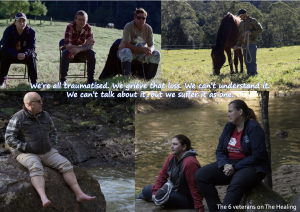
Around the warmth of a campfire at night, we eased into our new surroundings. The fire kept us warm and safe as we shared stories and began the process of healing. Our week was to embody and embrace a new alternative therapy by retraining ex-racehorses. We have something all in common, both horses and humans were traumatised. We have all lost our careers and our homes, including the ex-racehorse we were about to meet – Bazaconi.
With expert horseman and trainer Scott Brodie by our side, we learned to communicate across barriers and languages by applying the slightest pressure to work Bazaconi in the round yard. Scott described to us the ability of horses and humans to survive trauma:
“Horses have a wonderful, quiet way of linking us to our more primitive, intuitive instincts. We can’t lie to them – they demand we be in the moment. If we surrender there is so much they can teach us.”
Scott brings us to a new understanding of how horses will begin the process of healing for us. Ex-racehorses and veterans share a powerful commonality. Both are highly trained, regimented and a great value to their employers, until they were forced to retire from Defence Force or the racing industry.
Scott teaches both groups new skills that build trust, patience and confidence. The horses begin their training for second careers as equestrian, therapy and recreational horses. We regain our confidence and self-esteem, and eventually, we are able to find new homes, return to work and/or begin to repair damaged relationships. It’s a win-win.
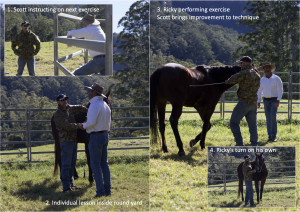
Action!
The day we had arrived we were all quick to hide in our dark holes, some of us could have easily drowned our sorrows in a bottle. By day two, our first turn each in the round yard with Bazaconi, it caused us to recognise our strengths and weaknesses and move beyond our limitations. Our anxiety and depression fell to the ground. The more we relaxed our bodies and dropped our shoulders, the less we were paying attention to ourselves and our trauma. We then started to notice this shift in ourselves and in each other – subtle changes in how our actions led Bazaconi to follow our lead.
Scott stood by us step by step, giving each of us an opportunity to communicate with this majestic animal on our own. Our responses from human to horse and horse to human instinctively become one. We survived together.
The Healing captures this incredible body language between horse and human. It tells the story of both traumatised veteran and ex-racehorse recently retired from their careers. The thoroughbred racehorse, elite athletes of the equine world, spend on average 9% of their life expectancy in the racing industry. The highly trained veteran, elite athletes of the population, spend on average 11% of their life expectancy in the military. The stakes are high for these former champions of the racing world and for our heroes of the Australian Defence Force.
Across Australia on average 8,500 racehorses exit the racing industry and 5,400 defence personnel leave every year. Of veterans who are medically discharged, 20% suicided or attempted to and 13% drank alcohol at dangerous levels (ABC news). These are higher numbers than the ex-racehorses who may find themselves slaughtered for pet food (6%). More is being done in the racing industry, particularly NSW to ensure no ex-racehorse is slaughtered, than for veterans who are often left to fend for themselves. Of those who have had an opportunity to engage in a supportive community, like with Scott Brodie at Thoroughbred & Veterans Welfare Alliance (TVWA), found themselves in a better place.
The Healing examines benefits of alternative proactive therapies for both horses and humans, and celebrates the good that can be accomplished when impassioned people serve and engage in direct action. If only there were more programs offering such opportunities!
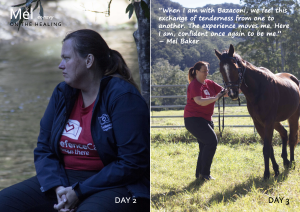
Hope!
When we were paying attention to what we were doing in the moment, then we started noticing the subtle changes in Bazaconi. He listened intently with his eyes and ears, and our movement, emotions and tones. If we got lost in thought, then Bazaconi would simply not listen. In fact, he would turn away. We needed to stay in the present moment, not reliving our harrowing memories of trauma from the past, but recognising our strengths and being drawn to his. When we took control of our actions and our voice, we communicated with Bazaconi directly and he did exactly what we wanted him to! Within this moment, an incredible connection happened: horse healing human healing horse.
With each new step we were learning a new dialect, we were enticing Bazaconi and engaging him into our understanding. We applied the slightest pressure to work Bazaconi in the field, to lead him along a journey of re-training him; and in turn this led us along a journey to be confident, assertive, joyful, and hopeful. Throughout the week it was noticeable, our confidence not only boosted and also Bazaconi’s confidence rose again – finding a mutual place of healing.
The portal of our pasts withered away as hope rosed to meet us and challenged us. It came in community. It came in trusting a new process and Scott encouraging us to find our confidence. It came in believing that healing was possible. It came in accepting what had happened to us and in believing in ourselves once more. No longer were we defeated people fighting for victory; we were victorious people created to fight defeat and rise above it.
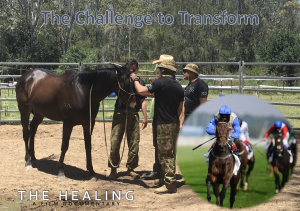
Transformation!
At the end of the week, we were standing on new inspired and empowered ground to return to the retirement village with a fresh sense of hope. We now believed we could make it. The challenge earlier in the week was to let go of the hopelessness; the challenge now is to keep believing in ourselves and start living again.
The Healing contains a message of hope for veterans and their families through its exploration of new forms of treatment which are gaining recognition and funding globally. It is a call to action for more support and assistance for those that have sacrificed much in the service of their country. The Healing is essentially about transformation and getting a second chance in life. It is an emotional journey of recovery and healing for both veterans and ex-racehorses.
In August 2013 after the Australian Federal Government conducted ‘A Rapid Evidence Assessment’, DVA concluded: “no evidence was able to be found to support the effectiveness of treating adults with PTSD using adventure therapy, art therapy, canine therapy, equine therapy or mindfulness”.
Romaniuk et al (Sep 2018) conducted research that supported “significant change” occurred in veterans using relational gestalt equine therapy with mindfulness and grounding techniques. Results indicated that depression, anxiety, stress and trauma symptoms significantly dropped after 5-day equine program; however, 3 months following the program without any further interaction with horses their symptoms returned to severe levels.
We are currently conducting our own research paper as part of the outcomes for The Healing to make changes for all Australians who suffer from mental health disorders. Results so far indicate that equine therapy builds a stronger stability and functionality that is needed for reducing PTSD, depression and anxiety. In consideration of the 2018 research, it is imperative that ongoing connection with horses and/or animals is important to continue that change.
Working with horses builds confidence and self-esteem levels to overcome trauma. This is naturally enhanced through a sense of achievement in retraining an ex-racehorse. One year after the filming of The Healing, on average our confidence, self-worth, self-love and hope went up by 14% and for half of us it increased 24-29%. Unfortunately, one out of six veterans had a negative effect on these areas after one year. This reiterates that working with horses is not for everyone, but neither is the medical model that the current government system supplies veterans suffering from PTSD.
Around 1 million Australians have depression. 22% of these cases could have been prevented or minimised if people exercised 150 minutes per week outdoors (Black Dog Institute). The veterans on The Healing on average increased our recreational time outdoors by 30%. Our physical functionality increased by 11%, this included better sleep (up 30%). The highest growth point after working with ex-racehorses for a year through the TVWA’s program was the ability for us to sustain ourselves. This grew on average 30% overall, and for one veteran 70%, who was the first to move out of Homes for Heroes into their own rental property.
When horses and humans connect, there is a powerful empathy of their joint experiences and reactions that help each other to heal. As Nick Barkla, Director of The Healing, watched this amazing transformation of change in us veterans and Bazaconi over time; it reminds us, if we are having a tough day spend time with a horse or dog outdoors. It makes the world of difference – for them and us!
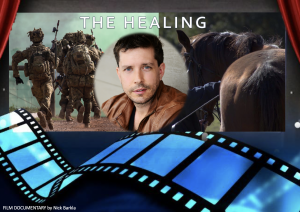
Follow The Healing on Facebook – @thehealingdocumentary
Romaniuk M, Evans J, Kidd C (2018) Evaluation of an equine-assisted therapy program for veterans who identify as ‘wounded, injured or ill’ and their partners. PLoS ONE 13(9): e0203943. https://doi.org/10.1371/journal.pone.0203943
More about Dr. Mel Baker
Dr. Mel Baker founded Unchain your Wellbeing creating a successful model out of evidence-based and practice-based research to enable people to find healing in themselves. She has created and developed over 48 educational resources, including a wellbeing board game, for people suffering from trauma that are being used by practitioners in mental health.
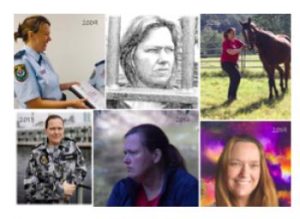
For 30 years, Mel has been a motivational speaker in Australia and overseas. She has written various genres, including the publishing of 2 books on her journey through trauma to acceptance. After completing her Master of Adult Education at 32, she embarked on her doctoral thesis whilst working as Lead Chaplain & Educator for Post Trauma Support in the NSW Police Force. Her doctoral studies took her to training and collaborating with 5 police forces around the world. She then served in the Royal Australian Navy. Mel was medically discharged in 2015 to face loss of income, homelessness and everything she had worked towards to help and encourage others to be the best they can be.
It was from opportunities given to her through the Homes for Heroes program that Mel was able to find herself again, including learning equine therapy and featuring in a documentary called ‘The Healing’ – how ex-racehorses help traumatised veterans in their recovery. She volunteers her time as an Associate Producer for the documentary as she believes in the importance of getting this film funded to be finished and is writing a research paper in order to achieve the outcomes of better services for veterans and first responders who suffer from PTSD.

